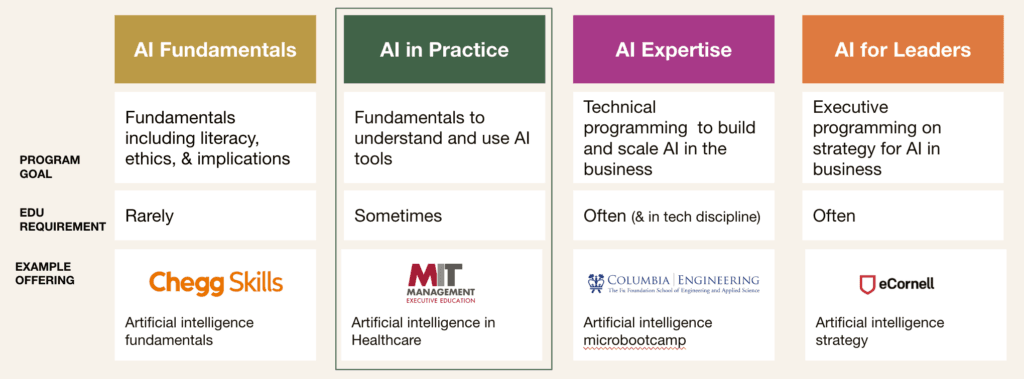Alex Cannon |
While healthcare leaders believe AI will transform their industry, most do not have an AI strategy.
In fact, only 6% of leaders at health systems have an AI strategy in place according to Bain & Company. Yet, 91% of healthcare leaders said that AI and machine learning would become critical for their organizations’ long-term success. What’s more — a recent Guild survey found that healthcare workers are eager to develop AI skills as AI usage increases.
AI’s impact across healthcare organizations continues to gain clarity:
AI will be transformative in allowing clinicians to spend more time delivering quality patient care.
AI will be critical to augmenting and automating things like administrative tasks.
AI will be important in scaling health systems operations.
AI will help deliver strong patient outcomes while ensuring strong financial performance.
AI is something employees want to learn.
As excitement about Generative AI peaks, employers have a short window of opportunity to build their talent for an AI-powered future. The most successful organizations will be those who harness today’s AI excitement and invest in their people to develop the hard-to-obtain skills, knowledge, and capabilities.
Enable AI skills with equity, agility and scale for healthcare talent.
While AI has captured the attention of employers and employees alike, the majority of AI skilling offerings in the market are built for the few (leaders & engineers) rather than for the majority (frontline + early / mid career allied health, clinical, or non-technical professionals). Yet in healthcare specifically, the benefits of upleveling diverse talent across your workforce is linked to critical growth levers.
The benefits of upleveling diverse talent
![]() Better organizational performance
Better organizational performance
Companies that are more gender and racially diverse outperform their peers in innovation, effectiveness, and see improved financial performance.
Higher patient experience scores
Patients prefer doctors who share their race/ethnicity.
![]() Stronger innovation
Stronger innovation
Organizations that prioritize diversity and inclusion report a 4x multiplier effect on their ability to innovate.
AI is set to impact nearly all employee personas. While some seek basic AI understanding others are looking for more innovative and strategic applications. At Guild, we’ve seen application volume in AI programs grow by 800% in the last 12 months (as of Aug 2023) for employers with AI programs in their catalog. Yet while most healthcare workers have AI awareness, AI tool adoption rates in the workplace is still lagging — fueling a growing divide.

SOURCE (both stats): Survey data collected from Guild members and learners within the healthcare industry in June and September 2023 (n=392)
We’re about to see a major disruption in how everyone works, and I do think that the frontline population will be impacted most.”
Bijal Shah, Guild CEO at a CNBC Disruptor 50 event on AI.
For organizations to equitably build an AI-enabled workforce, Guild believes employers need skilling programs across 4 core learning areas: AI fundamentals, AI in Practice, AI Expertise, and AI for Leaders.
Leveraging our learning marketplace of vetted providers, education and skilling offerings have quickly expanded to ensure applicable content for all learning areas. We also continue to innovate with partners where necessary to fill gaps.

Guild has expanded the number of AI programs in our marketplace by ~3x including at least 15 that do not require a bachelor’s degree.
Automate, augment, and accelerate your workforce with AI
AI can become an operational and clinical advantage for healthcare organizations. Its potential to create efficiencies, augment the patient experience, and alleviate administrative burden have inspired plans to invest in a variety of AI-powered solutions. Here are a few questions to ask as you think about skilling at scale.
01. What processes or job tasks are most likely to be augmented by AI?
Certain roles in your healthcare organization have a mix of manual tasks and responsibilities that require human discernment and judgment. With training around AI, these employees can augment their capabilities, and drive productivity while freeing up time for the human-centric tasks.
For example, organizations can leverage AI to automate administrative tasks allowing clinicians to spend more time doing what they love (patient-care) and what they uniquely can do that AI can't (again patient-care).
02. What processes are most likely to be automated by AI?
If AI is able to do certain tasks more efficiently, explore other areas of the organization where displaced talent could potentially grow. What skills should they be learning instead? This can be a balance, as people and clinical leaders still need that talent today but also want to create pathways into future-proof roles that aren’t at high risk of automation.
03. What are the human skills that can’t be augmented or automated by AI?
Think of skills like decision-making, problem solving, and communication. These are durable skills, or professional skills that improve performance and ensure employees can meaningfully engage with their work, peers, and managers.
Durable skills are job agnostic, and in fact are needed for all high-demand jobs. Investing in these skills is critical to strengthen the foundation of a resilient workforce. enabling healthcare organizations to leverage technology in the first place while also enabling more career mobility into in-demand roles.
Guide talent transformation through constant change.
AI in healthcare is exciting for many, but In an industry beleaguered with talent shortages, employees might not feel they have the time to explore or adopt new tools — and may end up feeling more threatened than inspired.
But if AI adoption is important for a future of more equitable patient care and ways of working, workforce upskilling is a sensible (and highly strategic) place to start.